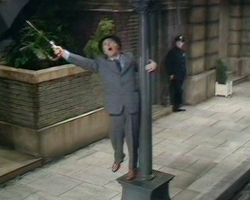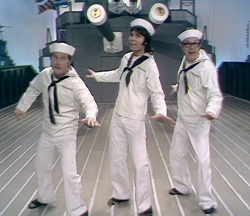I’m a song and dance man – not a comic
1971 Article

Singing In The Rain

Routine with Cliff Richard
Ernie Wise talks to the Slough Evening Mail in 1971
I’m really a song and dance man. I’m not an out-and-out comic. Singing and dancing is what I like to do, and it’s the one thing I don’t do a lot of.
If Eric had to give up…. Well, I’d have a bit of a shock, like I did when he had his first heart attack, but I think I’d have to pick up the reins ans sort of develop again.
I mean I wouldn’t have another partner; I wouldn’t form another double act. I think I would have to carry on single and do the best I could. Whether one could make it on the same level is another matter.
I’d be more of an all-round entertainer, like Des O’Connor or Max Bygraves. All right, so I’ve probably heard Frank Sinatra sing and seen Gene Kelly dance, but still…
As far as the show goes I think you could say that Eric’s definitely the end product and I sort of project him. But we’re more like Laurel and Hardy now – I don’t mean like Laurel and Hardy – I mean both funny men, rather than Abbot and Castello, where one was a definite comedian.
This sketch as the end where I’m supposed to have written a play and got the stars along and Eric always ruins it, this was an idea that was developed by Eddie Braben, and it’s paid off wonderfully.
I mean people really are under the impression that I write those plays. It was to give me a niche – it’s given me a more definite position, and it’s given us a very nice format.
Why BBC2? Well, when we signed for the BBC they only had colour on 2, and we made a decision a matter of three years ago that we wouldn’t do anything except colour. We decided that colour was the future, and we wouldn’t do any of our comedy in black and white, and we think we’ve proved our point because everybody’s gone colour mad. And somehow the comedy looks better on colour, funnier – I don’t know why.
Of course it also meant that we were one of the first British comedy shows to go to America.
But really we could do this show for anybody, not necessarily the BBC. The important thing is the team, the four of us: Eddie, the writer, Johnny Ammonds, the producer, and Eric and me. If we had our own facilities we could do our own show.
It would cost a lot of money to do it that way. I should think, what, about £20,000. Then you’ve got to think of who would buy it, and whether they’d give us that much money for it.
We do sell well in Australia, and we went down very will in the States. We used to do a lot of Ed Sullivans, and we were making very good headway. We were doing exactly the same act; oh, we don’t change. I mean if we’re not acceptable as we are there’s nothing for us… we can’t adjust.
In the States they wanted us to talk about dollars and sidewalks. I mean Eric and I couldn’t come on and start talking about dollars and sidewalks and elevators. We wouldn’t want to sacrifice the home market for the American market, so money’s not the real answer.
All the good people make me laugh… Frankie Howerd, Tommy Cooper, Reg Varney, Harry Worth.
I laugh at our show too; I always watch them. I consider where we were slow, fast, where we went wrong, mistiming, whether it’s good, whether it’s bad. And don’t forget I don’t see him while we’re actually recording; you watch the next one, I’m nearly always facing the audience, I can’t see Eric; the only time I do see the finished product is on the box.
Criticism doesn’t affect me in the same way as it does Eric. I’m not as sensitive as he is; I don’t carry it with me. I mean I don’t like criticism, nobody likes criticism.
© Slough Evening Mail 1971